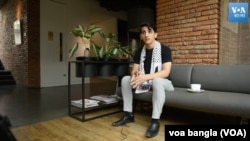Isaac Namoura, a 21-year-old Palestinian student with friends in Gaza, has been anxiously following the war between Israel and Hamas from Dhaka, Bangladesh, where he is a student at Shaheed Suhrawardy Medical College.
Before mobile phone communications with Gaza were cut off on Friday, Namoura managed to speak several times with his friends in the besieged territory. In a conversation with VOA's Bangla Service, he recounts what they have been telling him about their ordeal.
The following has been edited for length and clarity.
VOA: Do you have any relatives living in Gaza?
Isaac Namoura, student: Well, most of my friends are from Gaza, and they live there. I used to have relatives there too, including a cousin.
VOA: Have you heard from them?
Namoura: I do not hear from them every day. I texted some of them like two weeks ago, and I still haven't heard anything from some of them. I text daily, but I don't know if they can or not. Obviously, there is no electricity there, so I don't think they can charge their phones or contact anyone.
VOA: Do you know if any of your relatives have been victims of the attacks in Gaza?
Namoura: Not my relatives, but one of my friends. His cousin's entire family was wiped out — 12 people in total. Twelve people were completely wiped out. One of my seniors, his entire family got wiped out. He's the only one left.
VOA: According to what you're hearing from your friends and family over there, what's the situation in Gaza now?
Namoura: The situation there is horrific. I mean, during the day, there are still bombings, and there's no electricity; the electricity has been cut off, and water supply too. There are no medical services. They have no electricity, no food and especially no clean water. They cannot access clean water, so it's really horrific. I was on a call with one of my friends yesterday. I called him for a minute. In that minute itself, I heard around like 30 or 40 bombs around him, and I'm asking him, "Are you able to sleep?" He told me, "It's been three days since I slept." I asked him, "Have you been able to go to the washroom? Have you been able to shower? Have you been able to drink enough water?" He tells me, "No, we wait in lines for hours to use washrooms."
VOA: So, this friend of yours, he was able to charge his phone...
Namoura: Yeah, he was. He was able to charge his phone, I think from a power bank or something. Basically, in the hospitals, they have fuel. They had some fuel reserve, and I think it ran out like two days ago. There were like 25 active hospitals, and since the beginning of the strike, 15 of them stopped their operations because they had no fuel reserve and there was no electricity. And now there are barely four or five active hospitals right now. The fuel reserves are done. They are finished now.
VOA: Your friends, all the people of Gaza, are they under evacuation orders right now? If so, how are they coping with the situation?
Namoura: My senior [older friend], whom I called yesterday, was from an area called Juhor ad-Dik. If I'm not mistaken, it's from the northeastern side of Gaza. There were orders to evacuate the area. They evacuated to the south of Gaza, and they're living in tents. They are living in U.N. schools, which, by the way, are not safe either. Some of them have been bombed. There were also bombings around the school. Their situation is bad. It's really horrific. They are cut off from every basic need.
VOA: Are you in touch with the Palestinian Embassy? Are you getting enough information about your friends and family that are living in Gaza through the embassy?
Namoura: Yeah, I am in touch with the embassy since I am also a member of the Palestinian Student Union here in Bangladesh. The embassy does its ... diplomatic work like any other embassy. If they can, they also provide us with information. Whatever they can find out, they would inform us.
VOA: How does your life in Dhaka compare to life in the Gaza Strip?
Namoura: Bangladesh is a free country. In Dhaka, I can move around. I have access to safe and clean water all the time, 24/7. I have electricity 24/7! Just having those two things has made my experience in Dhaka far better than my experience in Gaza. Those two simple things, and fuel too. I also have access to medical services since I'm a medical student. Just those three things make life here way better. Much better than living in Gaza. I'm getting my basic human needs filled, and I'm so happy that I'm getting them.
VOA: What do you want to do when you go back?
Namoura: I'll go back after finishing my course. I've been here for two years now, two years and a month. Maybe after three or four years, I'm planning to go back home. I'm planning to stay there and do my internship. I'm also planning, if I get a chance, to do postgraduate studies in medicine. Maybe I will have to travel somewhere again to get my higher education in medicine, but the goal is to get the degree I want, then come back home and practice there. As a Palestinian, I first need to serve the people in need, and who's more in need than my own people? They are especially in need of me, you know, and my services as a doctor.




